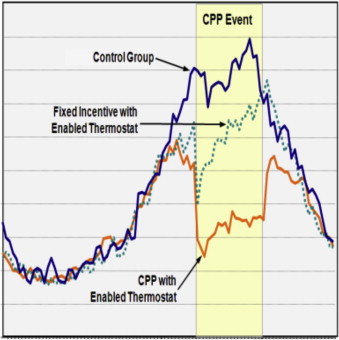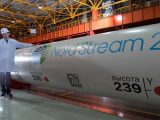
Water agencies and “virtual batteries”
December 23, 2019
Just a quick note here - I attended the Association of California Water Agencies' fall conference a few weeks back and the topic of "virtual batteries" in the water industry came up.
Water agencies use a lot of power in California - from simply pumping treated water uphill to storage tanks so water pressure still works when the power's out, to the treatment of that water and the wastewater, and to the massive distances and elevations the raw water often has to be moved to get to the treatment plants. At the same time we face an energy problem of variability in renewable energy production, with a lot of doomsaying involved over the difficulty of storing renewable power for when it's needed.
"Virtual batteries" for water agencies mean moving the times when the power is needed to when the renewable power is available, and that option is readily available for a lot of water agencies' work. The water district where I'm on the board, like most agencies, pumps water to uphill storage tanks late at night, when the electric grid has the least demand and charges the least. There's no reason why we can't pump during the day when solar power is up, or whenever wind is peaking, and the same is true for other water industry functions.
Some activities can even shift the seasons they operate, such as pumping water from large reservoirs to large aquifers for storage (or vice versa). As long as the reservoir has sufficient capacity, this could be done during the sunniest and windiest seasons of year.
I'm guessing these "unique" aspects of the water industry may not be so unique, and that a lot of other industries, and even households, can shift their time of use much more than we previously suspected.
Water agencies use a lot of power in California - from simply pumping treated water uphill to storage tanks so water pressure still works when the power's out, to the treatment of that water and the wastewater, and to the massive distances and elevations the raw water often has to be moved to get to the treatment plants. At the same time we face an energy problem of variability in renewable energy production, with a lot of doomsaying involved over the difficulty of storing renewable power for when it's needed.
"Virtual batteries" for water agencies mean moving the times when the power is needed to when the renewable power is available, and that option is readily available for a lot of water agencies' work. The water district where I'm on the board, like most agencies, pumps water to uphill storage tanks late at night, when the electric grid has the least demand and charges the least. There's no reason why we can't pump during the day when solar power is up, or whenever wind is peaking, and the same is true for other water industry functions.
Some activities can even shift the seasons they operate, such as pumping water from large reservoirs to large aquifers for storage (or vice versa). As long as the reservoir has sufficient capacity, this could be done during the sunniest and windiest seasons of year.
I'm guessing these "unique" aspects of the water industry may not be so unique, and that a lot of other industries, and even households, can shift their time of use much more than we previously suspected.


